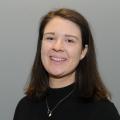
England's chief medical officer, Professor Chris Whitty and the government's top scientific adviser, Sir Patrick Vallance gave a live briefing at Downing Street at 11am this morning.
It was the first time the two advisers had addressed the UK public without the presence of any politicans.
Sir Patrick Vallance began the news conference by drawing on trends in other areas of Europe, particualry in France and Spain.
"As the increase spreads across age groups, we expect to see an increase in hospitilisations and, unfortunately, that increase in hospitilisations will lead to an increase in deaths," he said.
"The virus has moved a bit but it has not changed in its propensity to cause disease and to cause deaths.
"I want to remind you how quickly this can happen."
An ONS survey suggests about 6,000 are being infected a day.
Should the rate continue to increase exponentially, the two men warned the UK could be facing 50,000 cases a day by mid-October.
"We have in a bad sense, literally turned a corner," said Professor Chris Whitty.
"This is not someone else's problem, this is all of our problem."
Talking of the balance which must be struck by the government, Professor Whitty said: "If we do too little, this virus will get out of control. But if we go too far the other way, it can filter through to the economy, to unemployment, deprivation, poverty.
"We need always to keep these two sides in mind."
Sir Patrick Vallance says several vaccines are in "late stages" of testing.
However, no time-frame was given for when such a vaccine may be ready for use.
Hinting at restrictions that may come, Sir Patrick Vallance and Professor Chris Whitty stressed the important role of reducing unecessary household mixing.
“You cannot in an epidemic just take your own risk, unfortunately you’re taking a risk on behalf of everybody else. It’s important that we see this as something we have to do collectively,” said Professor Whitty.
He said the four things to do are washing hands and using masks, quarantine measures, and investing in vaccines and drugs.
“The third one, and in many ways the most difficult, is that we have to break unnecessary links between households because that is the way in which this virus is transmitted,” he said.
“And this means reducing social contacts whether they are at work, and this is where we have enormous gratitude to all the businesses for example who have worked so hard to make their environments Covid-secure to reduce the risk, and also in social environments.
“We all know we cannot do this without some significant downsides.
“This is a balance of risk between if we don’t do enough the virus will take off – and at the moment that is the path we’re clearly on – and if we do not change course we are going to find ourselves in a very difficult problem.”



Comments: Our rules
We want our comments to be a lively and valuable part of our community - a place where readers can debate and engage with the most important local issues. The ability to comment on our stories is a privilege, not a right, however, and that privilege may be withdrawn if it is abused or misused.
Please report any comments that break our rules.
Read the rules here